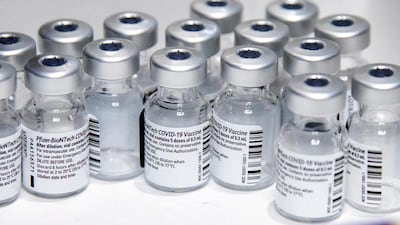US regulators on Monday authorised the Pfizer-BioNTech Covid-19 vaccine for use in children as young as 12, widening the country's inoculation programme as vaccination rates have slowed significantly.
The vaccine has been available under an emergency use authorisation to people as young as 16 in the US. The vaccine makers said they had started the process for full approval for those ages last week.
The US Food and Drug Administration (FDA) said it was amending the authorisation to include millions of children aged 12 to 15.
It is the first Covid-19 vaccine to be authorised in the US for this age group and is seen as an important step for returning children safely to schools.
"This is a promising development in our fight against the virus," US President Joe Biden said in a statement issued late Monday night. "If you are a parent who wants to protect your child, or a teenager who is interested in getting vaccinated, today’s decision is a step closer to that goal."
Mr Biden has asked states to make the vaccine available to the younger adolescents immediately after approval.
"Today’s action allows for a younger population to be protected from Covid-19, bringing us closer to returning to a sense of normalcy and to ending the pandemic," acting FDA commissioner Dr Janet Woodcock said in a statement.
"Parents and guardians can rest assured that the agency undertook a rigorous and thorough review of all available data, as we have with all of our Covid-19 vaccine emergency use authorisations."
Most children with Covid-19 only develop mild symptoms or no symptoms at all. However, children are not without risk of becoming seriously ill and they can still spread the virus. There have been outbreaks traced to sporting events and other activities for children in this age range.
Dr William Gruber, a top vaccine scientist at Pfizer, said the authorisation would help the US reach further immunity and protect an age group that has not been completely spared from severe disease.
"I hear from paediatricians and people out in the community what a godsend this is going to be for the adolescent population who have been restricted in terms of sports activities, drama club and the other sorts of things that naturally we want them to engage in," Dr Gruber said.
Mr Biden in his sattement referred to how the Centres for Disease Control and Prevention (CDC) is expected to issue guidance on the vaccine for young teens later this week.
"I look forward to speaking more about what today’s news means for our vaccination programme, but the bottom line is: The light at the end of the tunnel is growing, and today it got a little brighter."
Vaccines are crucial to ending the pandemic. But many health officials are concerned vaccine hesitancy in some adults will be even more pronounced when it comes to their children.
Parents may question the risk versus benefits, given the unknowns about the vaccines' long-term impact on children's' development and data on how few young children have been hit hard by Covid-19.
The companies said in March that they found the vaccine produced robust antibody responses and was safe and effective in 12- to 15-year-olds in a clinical trial.
In the trial of 2,260 adolescents aged 12 to 15, there were 18 cases of Covid-19 in the group that received a placebo and none among those who received the actual vaccine, resulting in 100 per cent efficacy in preventing the illness, the companies said at the time.
Pfizer and BioNTech asked the FDA to expand their authorisation to include the younger age group in early April.
About 46 per cent of people in the US had received at least one dose of a Covid-19 vaccine as of Sunday, according to the US CDC.
But the pace of US vaccinations has slowed significantly since topping out at a seven-day average of more than 3.3 million doses a day in mid-April. That average had fallen by more than a third to around 2.1 million shots a day as of May 4, according to CDC data.
Pfizer's vaccine is the only one authorised for 16- and 17-yea-olds in the US. About 2 million people in that age group have received at least one shot, according to CDC data.
Widely vaccinating children aged 12 to 18 could allow US schools to relax the masking and social distancing measures suggested by the CDC.
Pfizer has said it expects to have safety and efficacy data for children ages two to 11 in September, when it plans to ask for further expansion of the authorisation for that age group.

